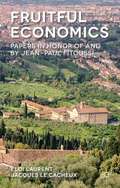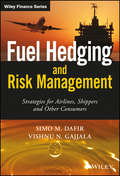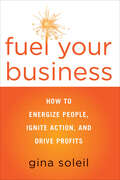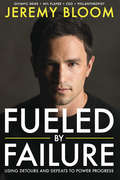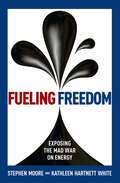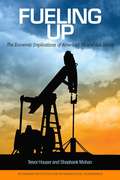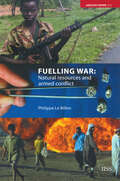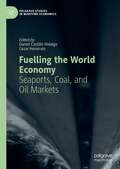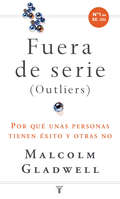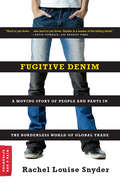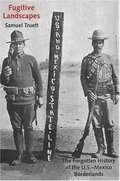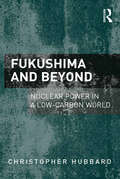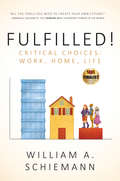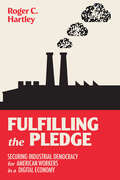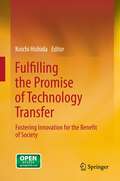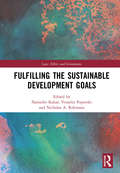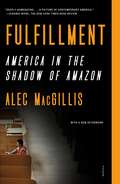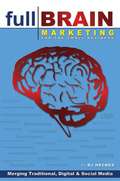- Table View
- List View
Frugality: Are We Fretting Too Much? Household Saving and Assets in the United States
by Evan Tanner Yasser AbdihA report from the International Monetary Fund.
Fruitful Economics
by Éloi Laurent Jacques Le CacheuxJean-Paul Fitoussi has left a big mark both in terms of scholarship and policy-making influence around the world, and even more in Europe and France. Fitoussi's pluralistic approach has shaped modern macroeconomics, political economy, economics of inequality and, more recently, the economics of sustainability. This volume is both a tribute to and study of the French economist Jean-Paul Fitoussi. The text is edited by two of Fitoussi's closest collaborators over the years and includes contributions from five Nobel Prize winners, all also Fitoussi's co-authors and friends: Kenneth Arrow, Edmund Phelps, Amartya Sen, Robert Solow and Joseph Stiglitz. The volume editors provide a comprehensive introduction which contextualises Fitoussi's work and discusses his interpretations of Keynesian economics and the financial crises, as well as a broad outline of his ideas. The contributors closely examine Fitoussi's macroeconomic theory on managing economic policy, his ideas on Europe's integration, sustainability and measurement of the economic world. The format of the volume is original, since it allows Fitoussi to respond to three of the five Nobel prize winners, and is unique in providing a wide scope of opinions from top authorities in the field. This collection is a key study of Fitoussi's ideas making it essential reading for students and researchers of macroeconomic policy, European political economy and sustainability, as well as being of importance to policy-makers, civil-servants and the interested lay person.
Fu Ji Food and Catering
by Li Jin Li Liao Wenkai Sun Jielun ZhuFu Ji, the largest corporate caterer in China, is thinking about how its financing strategy accommodates the overall corporate strategy. Fu Ji has enjoyed phenomenal growth as the corporate catering market in China develops. But that growth in the business also entails a transition from a single restaurant to a restaurant chain, then to a catering business. Is Fu Ji well equipped for the new business model? What does it need to do on the financing side to accommodate the transition of its business model? The company is listed on the Hong Kong Stock Exchange and is thinking about issuing additional convertible bonds to finance its growth. What is the funding need? What are the alternative sources of funding that it has? How would the choice of financial instrument affect, and be affected by, the business strategy and how is the instrument choice influenced by the general development of the financial markets in China?
FuckUp: Das Scheitern von heute sind die Erfolge von morgen
by Bert OverlackNur weil wir in einer Gesellschaft leben, die sich aus historischen Werten heraus schwer damit tut, Scheitern zu akzeptieren, heißt es nicht, dass dieser Anspruch auch heute noch Maßstab für alles sein muss. Mit »FuckUp. Das Scheitern von heute sind die Erfolge von morgen« lernt der Leser, sich mit der Möglichkeit einer Krise und des Scheiterns auseinanderzusetzen. Er erfährt, wie er im beruflichen Kontext proaktiv mit Scheitern umgehen und welche Maßnahmen er ergreifen kann, um es zu vermeiden. Scheitern ist in den allermeisten Fällen keine Wertung der Person, sondern ein biografisches Ereignis, das Zeit braucht, um verarbeitet werden zu können. Der Autor kennt den internationalen Erfolg durch Expansion und Aufschwung genauso wie die Insolvenz seines Unternehmens und die damit verbundenen täglichen Herausforderungen. Das Buch ist kein theoretisches Werk mit abstrakten Abhandlungen, sondern beinhaltet ganz konkret das Erleben des Autors, ohne seine Geschichte in den Vordergrund zu stellen. Ein Betroffener erkennt sich selbst und zieht daraus einen direkten Nutzen. Wer mitten drinsteckt in einem Prozess des Scheiterns, bekommt hier genauso Tipps und Hinweise an die Hand wie jeder, der dem vorsorgen möchte. »FuckUp. Das Scheitern von heute sind die Erfolge von morgen« ist das Buch für einen anderen Umgang mit unserer Fehlerkultur.
Fuel Cells in the Waste-to-Energy Chain
by Angelo Moreno Stephen J. Mcphail Viviana CigolottiAs the availability of fossils fuels becomes more limited, the negative impact of their consumption becomes an increasingly relevant factor in our choices with regards to primary energy sources. The exponentially increasing demand for energy is reflected in the mass generation of by-products and waste flows which characterize current society's development and use of fossil sources. The potential for recoverable material and energy in these ever-increasing refuse flows is huge, even after the separation of hazardous constituent elements, allowing safe and sustainable further exploitation of an otherwise 'wasted' resource. Fuel Cells in the Waste-to-Energy Chain explores the concept of waste-to-energy through a 5 step process which reflects the stages during the transformation of refuse flows to a valuable commodity such as clean energy. By providing selected, integrated alternatives to the current centralized, wasteful, fossil-fuel based infrastructure, Fuel Cells in the Waste-to-Energy Chain explores how the concept of waste-to-energy can be constructed and developed into a realistic solution. The entire spectrum of current and future energy problems is illuminated through the explanation of the operational, integration and marketing implications of high efficiency technological solutions using the real context of developed regions such as Europe. Up-to-date reviews are provided on the status of technology and demonstration, implementation and marketing perspectives. The detailed technological information and insight gathered from over twenty years of experience in the field makes Fuel Cells in the Waste-to-Energy Chain a valuable resource for all engineers and researchers in the fields of energy supply systems and waste conversion, as well as providing a key reference for discussions by policy makers, marketing experts and industry developers working in energy supply and waste management.
Fuel Hedging And Risk Management: Strategies For Airlines, Shippers And Other Consumers (The Wiley Finance Series)
by Mohamed Dafir Vishnu N. GajjalaA foundational guide to navigating the new fuel markets Fuel Hedging and Risk Management: Strategies for Airlines, Shippers and Other Consumersprovides a clear and practical understanding of commodity price dynamics, key fuel hedging techniques, and risk management strategies for the corporate fuel consumer. It covers the commodity markets and derivative instruments in a manner accessible to corporate treasurers, financial officers, risk managers, commodity traders, structurers, as well as quantitative professionals dealing in the energy markets. With the regime changes and elevated volatility observed in commodity prices over the last decade, fuel consumers are increasingly vulnerable to price shocks. The airline and shipping industries in particular have seen major structural and operational changes, with financial risk management superseding operational management in determining profitability. This book aims to present practical hedging solutions for managing fuel price risks while developing a holistic understanding of the risk management process, starting from hedge programme development and derivative structuring to financing, risk measurement and credit exposure management. The book includes a wide variety of key topics, including a discussion of commodities and derivatives markets, financial risk analysis of commodity consumers, hedge programme design and implementation, vanilla hedging, and exotic hedging products. Advanced topics covered include commodity price and volatility models, the impact of model choice on exotic derivatives pricing and risk management, as well as credit risk in commodity derivatives transactions and associated CVA costs. The book is unique in providing intuitive guidance on understanding forward curve dynamics and volatility term structure evolution for commodities. It also helps link hedging-related decisions to the financing strategy of a firm, offering integrated solutions that exploit synergies available through bundling. Fully up-to-date and relevant, this useful guide gives you the information you need to successfully deal with volatile fuel prices. The book illustrates the use of derivatives in real-world situations to manage commodity price risk with the help of term-sheets, payoff profiles, and scenario analysis. Comprehensive case studies illustrate the hedging process from conception to execution and monitoring of hedges in diverse situations, including hedge-portfolio restructuring and bundled financing, and hedging. Readers of this book can expect to: Develop a good understanding of fuel markets, derivatives market conventions, and popular hedge structures. Gain expert insight into all aspects of fuel hedging, price and volatility drivers, and dynamics Learn how to navigate energy prices and guard against volatility by employing effective risk management techniques Manage credit risk associated with commodity derivatives by understanding credit risk calculations, exposure optimization techniques, credit charges, such as CVA, DVA etc.
Fuel Your Business: How to Energize People, Ignite Action, and Drive Profits
by Gina Soleil“The next generation resource for leaders . . . demonstrates the need for the intersection of human energy, overall well-being, and value-based leadership.” —Jean Nitchals, partner, Niche Solutions, LLCGina Soleil takes you through a thought-provoking journey on how to transform your business into a haven of productivity. Using the science of energy, Gina gives you a step-by-step roadmap for building a business that’s fueled to win in today’s market. Soleil reveals the intersection between human energy and business, exposing the truth about how to attract what you want—energy, action, and profits.Human energy is the door of opportunity for business. As the demands of our connected world increase, people no longer have the energy they once had to be fully engaged, productive, and innovative in the workplace—leaving business leaders in search of a solution.In Fuel Your Business, you will discover life- and business-changing keys to success, such as:How the science of energy is the secret to profitHow to free your business from toxic energy that wants to hold you backHow taking the assessment and knowing your score will put your business on the performance fast trackHow to attract the energy you want—now!“Brilliant in the way few books are . . . These ideas will revolutionize how we look at business, economics, public policy and so much more.” —Jennifer Hovelsrud, corporate communications, UnitedHealth Group“When business leaders escape their preconceptions and embrace her energy-centered approach we’ll all enjoy a transformation in American business culture.” —James Matheson, president and partner, Network Medics, Inc.
Fueled By Failure
by Jeremy Bloom Greg GormanFueled by Failure: Dare to Fail. Dare to Succeed.Olympian and former NFL player now thriving as a CEO and Philanthropist, Jeremy Bloom pulls at the common thread that unites him with all of us: the defeats we encounter on our journeys to reach our goals. Sharing his hard-earned insights, advice, and practices including lessons from respected coaches, phenomenal athletes, and highly successful business leaders, Bloom coaches you in tackling defeats-big and small-and using them to drive, not derail, your success.Bloom covers:How to rebound and reprogram after defeatHow to utilize the lessons from failuresWhich motivators evoke winning resultsTactics for managing expectations for yourself and/or your teamHow to create a badass business cultureLeaving a legacys to failure's lessons, and plotting a new course. Lessons and practices are illustrated by Jeremy's own story, which include NFL Hall of Famers, Olympic champions, and insights and advice from business leaders. Case studies and interviews with other practicing entrepreneurs are also presented.
Fueling Freedom: Exposing the Mad War on Energy
by Stephen Moore Kathleen Hartnett WhiteFossil fuel energy is the lifeblood of the modern world. Before the Industrial Revolution, humanity depended on solar energy captured in living plants. But with the ability to harness the energy in coal and other fossil fuels, human quality of life and capacity for progress increased exponentially. With the recent advent of safe fracking techniques and incredible innovations in the energy industry, fossil fuels are as promising an energy resource as ever. Yet, highly politicized climate policies are pushing a grand-scale shift to new and less efficient energy sources. Is such a shift really necessary? If fossil fuel energy is supplanted by less efficient and less affordable alternatives for political reasons, will the modern world suffer?
Fueling Up: The Economic Implications of America's Oil and Gas Boom
by Trevor Houser Shashank MohanNew drilling techniques for oil and natural gas are propelling an energy production renaissance in the United States. As the US economy struggles to emerge from the Great Recession, many see the boom as a possible source of economic salvation that could reduce unemployment and revitalize American manufacturing. Until now, however, there has been little objective analysis of the energy boom's economic consequences.In this major study, Trevor Houser and Shashank Mohan fill that gap. They assess the impact of the recent and projected increase in domestic energy production on US GDP, employment growth, manufacturing competitiveness, household expenditures, and international trade balance. Alongside its economic impact, the American energy revolution is raising new environmental and trade policy questions. What are the consequences for the environment and global warming of increased domestic oil and gas production? Should companies be allowed to export the energy they produce or will doing so undermine American manufacturing competitiveness? Houser and Mohan provide independent research and analysis that will help policymakers navigate these issues.
Fueling Up: The Economic Implications of America's Oil and Gas Boom
by Trevor Houser Shashank MohanNew drilling techniques for oil and natural gas are propelling an energy production renaissance in the United States. As the US economy struggles to emerge from the Great Recession, many see the boom as a possible source of economic salvation that could reduce unemployment and revitalize American manufacturing. Until now, however, there has been little objective analysis of the energy boom's economic consequences.In this major study, Trevor Houser and Shashank Mohan fill that gap. They assess the impact of the recent and projected increase in domestic energy production on US GDP, employment growth, manufacturing competitiveness, household expenditures, and international trade balance. Alongside its economic impact, the American energy revolution is raising new environmental and trade policy questions. What are the consequences for the environment and global warming of increased domestic oil and gas production? Should companies be allowed to export the energy they produce or will doing so undermine American manufacturing competitiveness? Houser and Mohan provide independent research and analysis that will help policymakers navigate these issues.
Fuelling War: Natural Resources and Armed Conflicts (Adelphi series #373)
by Philippe Le BillonA generous endowment of natural resources should favour rapid economic and social development. The experience of countries like Angola and Iraq, however, suggests that resource wealth often proves a curse rather than a blessing. Billions of dollars from resource exploitation benefit repressive regimes and rebel groups, at a massive cost for local populations. This Adelphi Paper analyses the economic and political vulnerability of resource-dependent countries; assesses how resources influence the likelihood and course of conflicts; and discusses current initiatives to improve resource governance in the interest of peace. It concludes that long-term stability in resource-exporting regions will depend on their developmental outcomes, and calls for a broad reform agenda prioritising the basic needs and security of local populations.
Fuelling the World Economy: Seaports, Coal, and Oil Markets (Palgrave Studies in Maritime Economics)
by Daniel Castillo Hidalgo Cezar HonoratoThis book explores the functioning of coal markets and their influence on ports and maritime economics since the second half of the nineteenth century. Each chapter includes case studies from different parts of the world, explaining the role played by coal in the expansion of the shipping industry. This book also explores regions usually neglected by the mainstream scholarly literature in this field. The relationship between steam engine technology and imperial expansion, how the emergence of global security was driven by maritime technological revolutions, and the connection between global seaports and the spread of global economic and political systems are also discussed.This book aims to highlight the important role seaports and fuel markets played in the evolution of international commercial flows and activities. Fuelling the World Economy will be useful for historians, economists, and geographers interested in maritime and energy issues, as well as researchers interested in transport and technology.
Fuera de serie: Por qué unas personas tienen éxito y otras no
by Malcolm GladwellDel máximo gurú de los negocios, autor de La clave del éxito. The tipping point e Inteligencia intuitiva. ¿Qué diferencia a quienes hacen algo especial en la vida de quienes no lo hacen? Fuera de serie explora las curiosas historias de los grandes jugadores de fútbol; bucea en la peculiar infancia de Bill Gates; busca qué convirtió a los Beatles en el mejor grupo de rock; y se pregunta qué distingue a los pilotos que estrellan aviones de los que no. A través de su viaje por el mundo de los «fuera de serie», los mejores, los más brillantes y famosos, nos convence de que nuestro modo de pensar en el éxito es erróneo. Prestamos demasiada atención al aspecto de estas personas, y muy poca al lugar de donde vienen, es decir, a su cultura, su familia, su generación y a las singularidades de su educación. Brillante y entretenido, Fuera de serie es toda una referencia que al mismo tiempo iluminará y hará disfrutar. Reseñas:«Leer Fuera de serie es un verdadero placer, y Gladwell nos deja dándoles vueltas a sus ingeniosas teorías durante días.»David Leonhardt, The New York Times «Fuera de serie es un libro convincente y entusiasta. Su secreto es que no trata sólo de los fuera de serie, sino de la gente en general.»Robert Colvile, Telegraph «Las teorías de Malcolm Gladwell, que ya gozan de una impresionante popularidad, han convertido su apellido en un adjetivo: ¡Gladwelliano! En Fuera de serie, matiza nuestro culto al éxito.»Jason Zengerle, New York Magazine «Una vez más, Gladwell demuestra dominar un género del que, de hecho, es pionero: el de los libros que esclarecen las causas ocultas tras los fenómenos del día a día.»Publishers Weekly «Malcolm Gladwell, escritor de éxito masivo, se ha convertido en uno de los grandes especialistas de nuestro tiempo en iluminar las zonas de sombra con su mezcla de periodismo, estudios científicos, historia y filosofía. Amante de llevar la contraria [...] Su objetivo es colocar junto a la certeza un signo de interrogación. [...] Gladwell define su trabajo como "no ficción pop". [...] Es un cheerleader de las ciencias sociales. [...] A la vista de los millones de lectores que han devorado sus libros, cabría decir que hay algo tranquilizador en ver ideas confirmadas por los estudios citados. También es curioso y seductor.»El País Semanal «Un mago en los libros de autoayuda. [...] Con más de 10 millones de ejemplares vendidos, Malcolm Gladwell es uno de los principales escritores "motivacionales", gurú del éxito y analista de "estrategias para triunfar". La clave del éxito, Inteligencia intuitiva, Lo que vio el perro y Fuera de serie son libros que ejecutivos y líderes de todo tipo devoran en los aeropuertos.»La Gaceta de los negocios
Fugitive Denim: A Moving Story of People and Pants in the Borderless World of Global Trade
by Rachel Louise Snyder"A fascinating chronicle of the $55-billion-a-year global denim industry." --David Futrelle, Los Angeles Times Rachel Louise Snyder reports from the far reaches of the multi-billion-dollar denim industry in search of the people who make your clothes. From a cotton picker in Azerbaijan to a Cambodian seamstress, a denim maker in Italy to a fashion designer in New York, Snyder captures the human, environmental, and political forces at work in a complex and often absurd world. Neither polemic nor prescription, Fugitive Denim captures what it means to work in the twenty-first century.
Fugitive Landscapes: The Forgotten History of the U.S.-Mexico Borderlands
by Samuel TruettThis book reveals the forgotten story of their ambitious dreams and their ultimate failure to control this fugitive terrain. Focusing on a mining region that spilled across the Arizona--Sonora border, this book shows how entrepreneurs, corporations, and statesmen tried to domesticate nature and society within a transnational context. Efforts to tame a "wild" frontier were stymied by labor struggles, social conflict, and revolution. Fugitive Landscapes explores the making and unmaking of the U. S. -Mexico border, telling how ordinary people resisted the domination of empires, nations, and corporations to shape transnational history on their own terms. By moving beyond traditional national narratives, it offers new lessons for our own border-crossing age.
Fujifilm: A Second Foundation
by Giovanni Gavetti Yaichi Aoshima Mary TripsasFujifilm was the second largest manufacturer of photographic film in the world when digital imaging began to substitute for its core business. In contrast to some photography incumbents, such as Polaroid, Fuji had a relatively successful transition to digital imaging. In 2000, the company had more than a 20% share of the global digital camera market and at the same time had increased its share of the global film market to about 35% from just 18% in 1990. Despite this accomplishment, by 2006 the company felt the need to find new growth opportunities and was aggressively searching for other markets in which to apply its specialty chemicals expertise. In the process, however, the company had lost its sense of self. "If we aren't an imaging company, then what are we?" was the critical question posed by the CEO. The case examines both how Fuji was able to successfully move from analog to digital imaging and how the CEO should now think about finding a "second foundation."
Fukushima and Beyond: Nuclear Power in a Low-Carbon World
by Christopher HubbardThe catalyst for this study was the Fukushima-Daiichi major nuclear accident of 11 March 2011. In this event, a severe earthquake and15 metre tsunami caused serious damage and equipment failures at Japan’s Fukushima 1 Nuclear Power Plant which were judged by the International Atomic Energy Agency to be equally as serious as the Soviet Chernobyl nuclear disaster of 1986. Against a background of nuclear hesitancy and reassessment, the prospect of including or excluding nuclear power in a low-carbon twenty-first century world is now increasingly critical. It is in this emerging scenario and context that this book presents a full suite of historical, contemporary and projected data. Its use of complementary and comparative country-based case studies provides ample opportunity for developing strongly illustrative analysis of policy effectiveness in diverse polities and markets. In this way, it combines clear, comprehensive and rigorously science-based evidence, analysis and interpretation of data, all leading to conclusions and policy recommendations. Furthermore, it builds an understanding of the complexities and many challenges posed by the nuclear power option.
Fulfilled!: Critical Choices: Work, Home, Life
by William A. SchiemannNational Indie Excellence Awards, Finalist, 2017: Self-Help. Living Now Book Awards, Silver, 2017: Motivation - Practical Self-Improvement. Fulfilled! holds the key for every reader to figure out what they want most from life, both personally and professionally - and then stay focused in a consistent way to achieve their goals. The lessons in this book are based on interviews with over 100 life-fulfilled people and additional research on generational differences, leading to conclusions about what will work best for Millennials and Baby Boomers alike
Fulfilling the Pledge: Securing Industrial Democracy for American Workers in a Digital Economy
by Roger C. HartleyAn insightful and evidence-based assessment of our urgent need to enact labor law reform—and how to achieve it.Millions of non-union workers want unionization, but our current labor-management relations law conspires to deny them meaningful opportunities to secure collective workplace representation. The resulting low rates of collective bargaining impose economic, political, and social costs on us all. In Fulfilling the Pledge, Roger Hartley addresses the plight of American workers, who face a grim, uncertain future, as the digital workplace reshapes the hierarchical post–World War II industrial relations system that once gave workers a voice. Through empirical evidence and the lens of law and policy, Hartley examines what industrial sociologists call the chronic &“representation gap&” and clarifies how a wide-ranging movement could build a vocal constituency for the congressional enactment of labor law reform.The pledge made in the 1935 National Labor Relations Act to encourage establishment of industrial democracy—where workers possess a voice in their places of work—remains unfulfilled. Speaking to policymakers, scholars, historians, and the average citizen, Fulfilling the Pledge makes a compelling case for collective workplace representation that serves the greater good, even as American labor relations law continues to undermine collective bargaining by workers and becomes an increasingly significant political and social issue.
Fulfilling the Promise of Technology Transfer: Fostering Innovation for the Benefit of Society
by Koichi HishidaUniversities and research institutes are increasingly expected to contribute to society by creating innovation from the returns of their research results and the establishment of new technologies. Toward that goal, Keio University in Japan held an international symposium titled "Fulfilling the Promise of Technology Transfer: Fostering Innovation for the Benefit of Society." From that symposium the following contents are included in the present volume: 1) A showcase of ideas and case studies to promote future creation of innovation by universities and research institutes worldwide, including information on the R&D value chain, licensing, income generation, start-ups and mechanisms to encourage entrepreneurship, and the changing role of universities in fostering innovation. 2) Introduction of active research projects that aim to productize successful research results on an international level. For example, the book includes results of research on stem cell technologies and regenerative medicine as well as the realization and application of polymer photonics and the development of the core technology of polymer photonics. 3) Case studies from the U.K. in developing industry-academia collaboration with various business partners ranging from start-ups and spinout companies to large enterprises. 4) Reports of the achievements of the technological transfer activities at Keio University supported by the 5-year public fund, with suggestions for future prospects.
Fulfilling the Sustainable Development Goals: On a Quest for a Sustainable World (Law, Ethics and Governance)
by Narinder Kakar, Vesselin Popovski and Nicolas A. RobinsonThis book contains assessment of the progress, or the lack of it, in implementing the UN Sustainable Development Goals (SDGs). Through review of the assessments and of case studies, readers can draw lessons from the actions that could work to positively address the goals. The 2030 Agenda for Sustainable Development is designed to catalyze action in critical areas of importance to humanity and the planet. The effort to implement the SDGs, however, demands a sense of urgency in the face of environmental degradation, climate change, emerging conflicts, and growing inequality, among a number of other socio-economic problems. Five years after the launch of the 2030 Agenda, this book takes stock of how far the world has come and how we can position ourselves to achieve the global targets. The book is one of the first to assess how the implementation is impeded by the onset of COVID-19. It contains a special chapter on COVID-19 and the SDGs, while many thematic chapters on different SDGs also assess how COVID-19 adversely affects implementation, and what measures could be taken to minimize the adverse effects. This publication thus provides a fresh look at implementation of the SDGs highlighting impactful and creative actions that go beyond the business-as-usual development efforts. The volume reinforces this analysis with expert recommendations on how to support implementation efforts and achieve the SDGs through international and national strategies and the involvement of both the public and private sectors. The result is an indispensable textual tool for policy makers, academia, intergovernmental organizations (IGOs) and non-governmental organizations (NGOs), as well as the public, as we march toward the 2030 deadline.
Fulfillment: Winning and Losing in One-Click America
by Alec MacGillisA New York Times Book Review Editors' Choice"A grounded and expansive examination of the American economic divide . . . It takes a skillful journalist to weave data and anecdotes together so effectively." —Carolyn Kellogg, Los Angeles TimesAn award-winning journalist investigates Amazon’s impact on the wealth and poverty of towns and cities across the United States.In 1937, the famed writer and activist Upton Sinclair published a novel bearing the subtitle A Story of Ford-America. He blasted the callousness of a company worth “a billion dollars” that underpaid its workers while forcing them to engage in repetitive and sometimes dangerous assembly line labor. Eighty-three years later, the market capitalization of Amazon.com has exceeded one trillion dollars, while the value of the Ford Motor Company hovers around thirty billion. We have, it seems, entered the age of one-click America—and as the coronavirus makes Americans more dependent on online shopping, its sway will only intensify.Alec MacGillis’s Fulfillment is not another inside account or exposé of our most conspicuously dominant company. Rather, it is a literary investigation of the America that falls within that company’s growing shadow. As MacGillis shows, Amazon’s sprawling network of delivery hubs, data centers, and corporate campuses epitomizes a land where winner and loser cities and regions are drifting steadily apart, the civic fabric is unraveling, and work has become increasingly rudimentary and isolated.Ranging across the country, MacGillis tells the stories of those who’ve thrived and struggled to thrive in this rapidly changing environment. In Seattle, high-paid workers in new office towers displace a historic black neighborhood. In suburban Virginia, homeowners try to protect their neighborhood from the environmental impact of a new data center. Meanwhile, in El Paso, small office supply firms seek to weather Amazon’s takeover of government procurement, and in Baltimore a warehouse supplants a fabled steel plant. Fulfillment also shows how Amazon has become a force in Washington, D.C., ushering readers through a revolving door for lobbyists and government contractors and into CEO Jeff Bezos’s lavish Kalorama mansion.With empathy and breadth, MacGillis demonstrates the hidden human costs of the other inequality—not the growing gap between rich and poor, but the gap between the country’s winning and losing regions. The result is an intimate account of contemporary capitalism: its drive to innovate, its dark, pitiless magic, its remaking of America with every click.
Full Brain Marketing for the Small Business: Merging Traditional, Digital and Social Media
by D. J. HeckesWhy full BRAIN Marketing? Undoubtedly, one of the most often needs in today's business world is determining how to merge traditional, digital and social media marketing in a hypercompetitive environment! Some business owners are even saying: "Innovate or Die!" Marketing has changed and the way to reach your target audience is changing. The demand for constructive change and the speed of change in today's world is unprecedented. Customers are embracing change and adapting to new product offerings faster than ever and businesses must innovate if they are to have any reasonable chance of growth. But innovating successfully is not easy, especially when marketing that innovation. It can be costly, time consuming and, worst of all, if not done properly, odds are that it will fail. It is no longer a right brain or left brain world; it is the combination for full brain marketing that will work best for businesses in today's competitive intelligence world. Learn the new ways in which to acquire valuable insights into one's customer, ways in which to create game-changing ideas, and methods for reducing risk. 1. Are YOU ready for marketing? 2. Is your company branded? 3. Do you have a Competitive Edge? 4. Do you Tweet or Blog? 5. Are YOU Connected?
Full Court Faith: How We Can Be Used by God for His Good and Perfect Purpose
by George ShinnIn Full Court Faith, George Shinn's remarkable journey from small-town obscurity to NBA franchise owner shows how trusting God's plan can lead to incredible success, redemption, and miraculous life transformations."&“God has done many wonderful things in my life—but the biggest things aren&’t the accomplishments I used to take the most pride in.&” —George Shinn What can God do with a poor country boy from a small town in North Carolina? The child no one expected much from. The kid who finished high school dead last in his graduating class. One of only two students in the whole school on government assistance. The young man who had to clean business school toilets in exchange for tuition. The aspiring pro-sports franchise owner no one in New York or California took seriously. The victim of an extortion scandal that rocked the sports and business communities of Charlotte, North Carolina. The sinner whose private mistakes became front-page news for more than a year. What can God do with a person like that? Amazing things . . . things that lead to unbelievable fame and fortune. Wonderful things . . . things that brought new life and vigor to a southern gem no one outside the south had ever heard of. Miraculous things . . . things that have saved the lives of numerous stroke victims—including his own. Full Court Faith presents the uniquely inspiring life of Charlotte entrepreneur, businessman, and former NBA franchisee George Shinn, the man who brought professional sports to North Carolina. With charm, wit, humility, and his trademark enthusiasm, Shinn tells his story his way—taking responsibility for the mistakes and giving God all the credit for the victories. If you&’ve ever wondered, What could God do with someone like me? Full Court Faith brings you the answer: Anything He wants. As long as you&’re willing to trust Him on the journey.

